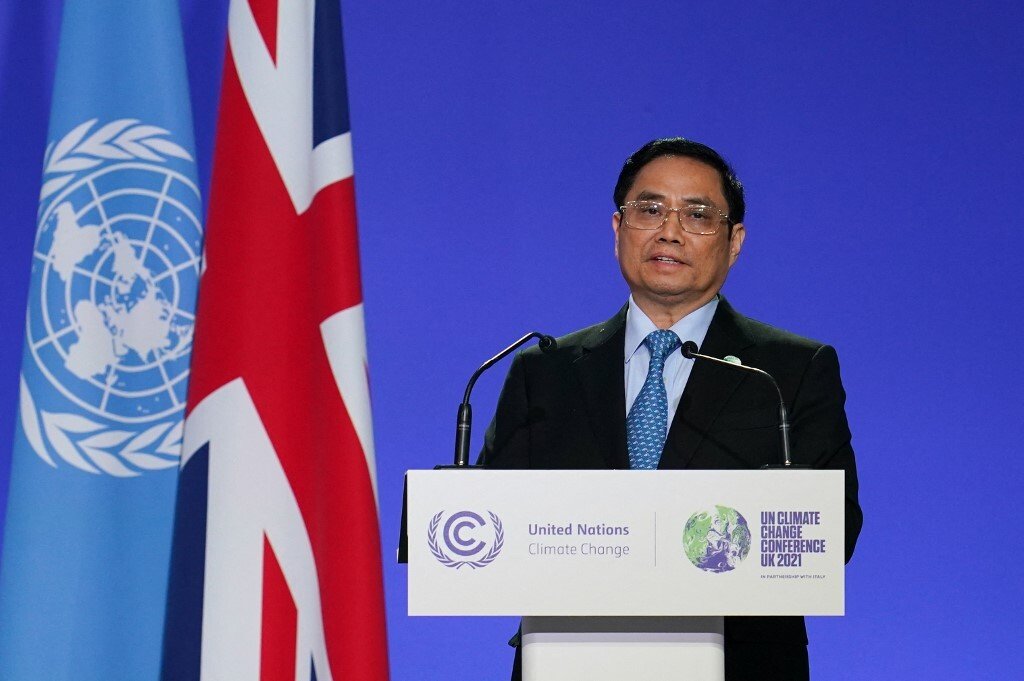Pre-COP Status: 🟢 COP26 Progress: 🟠 Post-COP Momentum: 🟢
COP26 Energy Day saw the global trend towards No New Coal translate into new country commitments. 18 countries pledged to no longer build coal power plants, including Viet Nam, home to the world’s third-largest pre-construction pipeline. More than 60 countries have now committed to No New Coal, highlighting the momentum away from the world’s dirtiest fuel. No New Coal is now the norm, even for those governments not yet ready to commit.
The collapse of new coal plans since the Paris Agreement
Limiting global warming to 1.5c or less cannot be achieved without ending the construction of new coal power plants. Positively, the global pipeline of planned coal power plants has contracted by 76% since 2015. This amounts to 1,175GW of cancelled capacity – the equivalent of China’s entire current operating fleet. In the OECD and EU, the pipeline has almost completely disappeared, leaving only a handful of countries still pursuing new coal.
China remains home to almost 55% of the global pre-construction pipeline, but has seen a 74% reduction in its planned projects since Paris. Among non-OECD countries (excluding China), the pre-construction pipeline has collapsed by 77% since 2015.
Going into COP26, only 36 countries still had plans for new coal plants, with 6 of them (China, India, Viet Nam, Indonesia, Turkey, and Bangladesh) accounting for 82% of the global pipeline. Of the remaining 30, 16 had only a single project under consideration. The key drivers behind this are the terrible economics of new coal, with new renewables out-competing coal in most markets, and the end of international public coal finance.
In response to this trend, the No New Coal Power Compact was launched by Sri Lanka, Chile, Montenegro, Denmark, the UK, France and Germany at the UN High Level Dialogue on Energy in September 2021. Signatories committed to cease permitting unabated coal-fired power generation projects immediately and end new construction by the end of the year, while issuing an open call for others to join them.
🔴In an unprecedented show of support in the fight against climate change, a group of governments including 🇱🇰🇨🇱🇲🇪🇩🇰🇬🇧🇫🇷🇩🇪 have committed to halting construction of new coal-fired power plants. @PastCoal @UN_Energy #NoNewCoal https://t.co/uSwIn27rYh
— SEforALL | SDG7 Pavilion at COP26 (@SEforALLorg) September 24, 2021
COP26 feeds off the energy towards No New Coal
Momentum grew further at COP26 with 18 countries pledging to not build any more coal power plants by signing up to the COP26 Global Coal to Clean Power Transition Statement, the PPCA, or the No New Coal Power Compact. This takes the combined list of nations that have committed to No New Coal to over 60.
Most notably among those new signatories was Viet Nam, home to the world’s third-largest coal project pipeline (19GW). Prime Minister Phạm Minh Chính’s ambitious announcement of a net zero target for 2050 triggered Viet Nam’s support for the statement, and is set to inform the countries new power plan, PDP8, after multiple revisions.
Morocco, the Ivory Coast and Poland each had a sole remaining project in the development pipeline, now expected to be cancelled. Egypt confirmed that it won’t build new coal, following its cancellation of over 17GW of proposed projects over recent years, showing that rapid action is possible.
Indonesia has the world’s 4th largest pipeline and partially signed the coal-to-clean statement, without endorsing No New Coal, highlighting the ongoing debate around new coal. Indonesia’s acknowledgement of the need to phase out coal power generation is clear. Yet their case for assistance for a possible 2040 exit would be strengthened by restricting new coal construction. Botswana did the same yet faces decisions as to whether to continue with a pipeline of nearly 3GW of coal projects or instead embrace solar with support from the international community.
On Energy Day, Selwin Hart, Special Advisor to the UN Secretary-General issued a call for action that no new coal-fired power plants should be built in 2022. At E3G and SEforALL’s event at COP26, Ministers Carlos Jobet of Chile and Duminda Dissanayake of Sri Lanka – co-leads of the No New Coal Power Compact – shared insights on their progress.
“We say ‘coal is cheap’, but that’s actually a lie. It’s just that we’re not paying the full price. We’re passing on that price to our children and grandchildren”
— Damilola Ogunbiyi (@DamilolaSDG7) November 5, 2021
Well said by Min. @JCJobet from #Chile. #NoNewCoal #SDG7Pavilion #SDG7BeBold@SEforALLorg @PastCoal @COP26 pic.twitter.com/yg1HHkbXuD
What needs to happen next?
- The end of new coal is clearly in sight. The remaining 33 countries still considering new coal power plants can follow the lead of over 60 others in committing to no new coal construction.
- The UK can keep No New Coal on the agenda for the remainder of its Presidency, calling on all remaining countries to step up. The No New Coal Power Compact provides a shared vehicle for cooperation, with valuable leadership from nations like Sri Lanka and Chile.
- Developing countries have reiterated the need for international support to assist No New Coal, including on unwinding power purchase agreements for as-yet-unbuilt coal plants.


